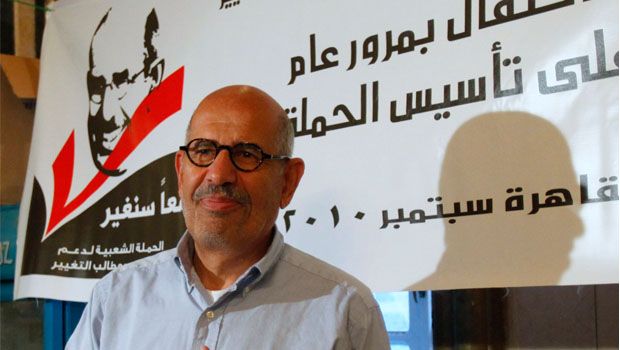Middle East Chronicles Egypt’s Missed Opportunity
New in Ceasefire - Posted on Tuesday, November 23, 2010 19:34 - 0 Comments
Mohamed El Baradei
By Chris Bowles
Next week’s Egyptian parliamentary elections have been publicised by the ageing patronage-based regime as being “freer and fairer”, with a new monitoring authority and a quota for women. Coming from a party that has enjoyed 32 consecutive years in power, this may not represent much to ordinary people.
Ignoring the legal obligation to vote in Egypt, as many as 75% of the electorate chose to show their political preferences in the 2005 round by avoiding the ballot altogether. Pessimism, together with healthy doses of political repression, have played a significant role in the exceptional electoral successes of Hosni Mubarak’s National Democratic Party (NDP).
It came as a shock then, in those same 2005 elections, that a party that had officially been outlawed since 1954, was able to take 20% (88) of the lower house seats. The Muslim Brotherhood, fielding independent candidates to circumvent a political ban, produced the most credible challenge to the incumbents in more than half a century. Despite the lack of any uniform campaign strategy, excepting the general slogan, “Islam is the Solution,” the group was able to mobilise sufficiently widespread popular support.
The Brotherhood’s record on the scene of Egyptian civil politics has also been a surprise to many of their critics. Although the local and international divisions of the movement have yet to change their stated long term goal of a unified Islamic Umma or “caliphate” across the Arab world, they have progressively engaged in civilian politics. Members have the highest record for parliamentary attendance and have banded with other opposition parties to consistently challenge NDP legislation, particularly in human rights.
Some observers had hoped that these 2010 elections would provide a staging ground for political reform in Egypt, with an expected change in President next year and a more liberal Washington offering support. They will likely be disappointed. A lot has changed since 2005, and Mubarak’s network has spent the last 5 years weighting the dice of democracy.
Changes to the constitution in 2005 and 2007 introduced the possibility of opposition parties fielding presidential candidates against the NDP, but required that independents garner the support of 230 other members of parliament. This clear limitation on the Muslim Brotherhood has been added to by a ban on the party’s religious slogan, and the imprisonment of many of its members and financiers.
The 2007 change also sought to introduce a more internationally acceptable alternative to the “State of Emergency” which has been in force in Egypt, almost uninterrupted, since 1967. A change to article 179 allows for the imposition of an anti-terrorism law and the permanent suspension of human rights. The government is currently managing the transfer to this semantically improved tool of political repression.
In the last couple of months at least 17 satellite television channels have been shut down, and another 20 warned, by the country’s main operator NileSat, after accusations of, “violating broadcasting licences.” This has been accompanied by a clampdown on telecommunication networks with new regulations requiring companies sending SMS messages to multiple phones to be registered. More than 20% of the Brotherhood’s candidates have been disqualified and the government has supported the arrests of hundreds of its members.
Many have seen these restrictions as a reason to avoid the elections altogether. The ex-UN Atomic Energy chief and government critic, Mohamed ElBaradei (National Association for Change), and the former presidential candidate, Ayman Nour (al-Ghad), have both called for a boycott.
Through its decision to stand in spite of these calls, and the repression it has suffered by opposing the regime, the Muslim Brotherhood has received a branding as the pioneer of Egypt’s popular reform movement. This honour however, bears closer consideration.
While the NDP has chosen to step up and put forward an absurd 800 candidates for the 508 seats available, the Brotherhood has specifically avoided building on their successes in the last elections. They intended to run only 135 candidates this year, a reduction of 25 from the initial figure in 2005. Internal predictions have estimated that they may retain as few as 15 seats this time round.
Whilst part of the blame for this strategy may be attributable to internal debate and the formation of an opposition front within the organisation, some must certainly lie at the door of the group’s philosophy. Despite the restrictions placed upon them standing in the presidential elections, the party has said that it would not field a candidate even if it could. Their policy has long been one of “participation, not domination “, and the organisation notably critiqued Hamas for winning, rather than simply running, in the 2006 Palestinian elections.
A policy of muted political action whilst formalising social, religious and organisational work, was entrenched by the election in January of Muhammad Badi‘ as the Brotherhood’s eighth General Guide. He has made it clear that the direction will be towards quiet social and educational projects rather than the noisy political presence of the last few years. They will continue to stand in elections but reverse any agenda of attaining a dominant influence.
Whilst some may mourn the likely effects of the boycotts and measured retreats on political representation and discourse today, it is difficult to blame them. The last five years have witnessed a wave of restrictions and penalties for exercising freedoms which have met with little opposition from the international community.
Obama’s dialogue has continued to be inconsistent, with a recent billion dollar arms sale approved to the authoritarian regime. One needs only to look across the barbed wire to Gaza to see how well received democratic expression can be.
Chris Bowles is a freelance journalist on Middle East politics and current affairs.



Leave a Reply